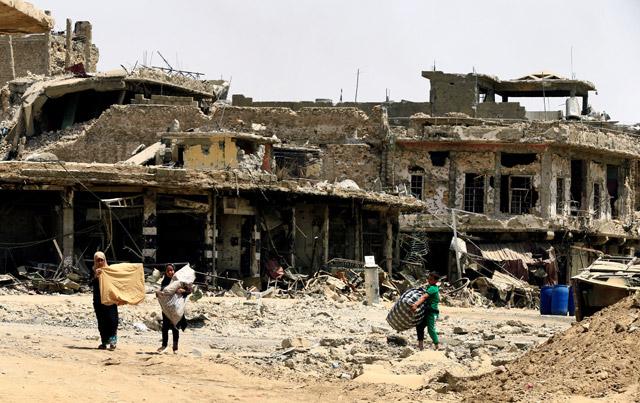You are here
Flooding forces Mosul residents to flee war in rickety boats
By Reuters - May 06,2017 - Last updated at May 06,2017

Displaced Iraqis cross the Tigris River by boat after the bridge has been temporarily closed, in western Mosul, Iraq, on Saturday (Reuters photo)
MOSUL, Iraq — The Iraqi man laid the body of his wife, wrapped in a black shroud, gently on the bow of a small wooden boat and held onto it as a second man rowed slowly to pick up the man’s three children standing a few metres away.
The two teenage girls and young boy climbed in, careful not to disturb the balance, for the crossing taking their mother, killed in an air strike this week, to the east bank of the Tigris River.
This crossing is no ancient rite, however.
It is an extra hardship heaped on the family by the flooding of the Tigris and the disassembly of the last pontoon bridge linking the two sides of Mosul, where US-backed Iraqi forces have been fighting to oust the Daesh terror group militants who seized the city in 2014.
Loading up everything from clothes and food to injured or dead relatives, hundreds of families exhausted by war have been crossing the river on small, rickety fishing boats capable of holding only five or six people.
Many have been leaving the Musherfa district of western Mosul after US-backed Iraqi forces took it from Daesh on Friday, hoping to reach the relative safety of the eastern banks of the river.
“We suffered Daesh’s injustice, and now that we are free we were promised five bridges,” said 45-year-old Mushref Mohamed, an ice factory worker from Musherfa. “Where are the bridges? We have been waiting for two days.”
“So many of my neighbours and friends died. We were freed, but we are not happy because we lost the people closest to us.”
The flooding has cut off all crossing points between east and west and forced the military to dismantle the makeshift bridges linking the two sides of Iraq’s second-largest city.
Destroyed bridges
Mothers carrying babies, men in wheelchairs and families of up to 15 people have been paying 1,000 Iraqi dinars ($0.86) per head to make the short journey, with many needing to make two or three trips.
Even soldiers carrying green army crates full of military documents and cigarettes have had to use the boats. The army initially planned to transport people using steamboats when they took down the pontoons, but now say they have run out of gas.
“We came from the early morning at 7am and have been waiting until now. It is noon. The steamboats do not have gas. This government cannot provide gas?” asked Mohsen, a pensioner from the Wadi Hajar area in west Mosul.
Mosul’s permanent bridges have mostly been destroyed during the seven-month campaign to take the city back from Daesh.
The army opened a new front in the war with an armoured division trying to advance into the city from the north on Thursday and taking back two areas on Friday.
The militants are now besieged in the northwestern corner of Mosul which includes the historic Old City, the medieval Grand Al Nuri Mosque and its landmark leaning minaret where Daesh leader Abu Bakr Al Baghdadi declared a “caliphate” spanning swathes of Syria and Iraq in June 2014.
The Iraqi army said on April 30 that it aimed to complete the retaking of Mosul, the largest city to have fallen under Daesh control in both Iraq and Syria, this month.
Related Articles
MOSUL — An air strike by the US-led coalition on Wednesday “disabled” the fourth bridge on the Tigris River in Mosul, leaving the northern I
BAGHDAD — Iraqi forces faced stiff resistance from the Daesh terror group in northwest Mosul on Sunday after opening a new front against the
MOSUL — On a pontoon bridge connecting East and West Mosul, residents of a city shattered by the battle to expel Daesh cross back and forth













